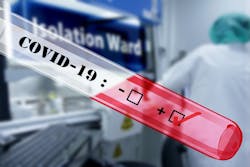HHS announces shipments of donated remdesivir for hospitalized patients with COVID-19
The U.S. Department of Health and Human Services’ (HHS) Office of the Assistant Secretary for Preparedness and Response (ASPR) announced the allocation plan for the drug remdesivir. The allocation is from a donation by Gilead Sciences, Inc. to the United States which was finalized on May 3, 2020. The donated doses of the treatment, which received an Emergency Use Authorization (EUA) from the U.S. Food and Drug Administration (FDA), will be used to treat hospitalized COVID-19 patients in areas of the country hardest hit by the pandemic.
Beginning on May 7, 2020, the process was initiated to deliver cases of the drug to the following states: Connecticut (30 cases), Illinois (140 cases), Iowa (10 cases), Maryland (30 cases), Michigan (40 cases) and New Jersey (110 cases). Each case contains 40 vials of the donated drug.
State health departments will distribute the doses to appropriate hospitals in their states because state and local health departments have the greatest insight into community-level needs in the COVID-19 response, including appropriate distribution of a treatment in limited supply. Healthcare providers interested in administering the donated experimental drug should contact their state health department. Candidates for the donated doses must be patients on ventilators or on extracorporeal membrane oxygenation or who require supplemental oxygen due to room-air blood oxygen levels at or below 94 percent. Public health experts from the federal government have been in contact with state health departments regarding these allocations.
Gilead Sciences, Inc. committed to supplying approximately 607,000 vials of the experimental drug over the next six weeks to treat an estimated 78,000 hospitalized COVID-19 patients under the EUA granted by the FDA. The donation to the United States is part of 1.5 million vials of remdesivir the company is donating worldwide.
The National Institutes of Health (NIH) and Gilead Sciences worked together to conduct a randomized controlled clinical trial of the investigational drug in hospitalized patients. Preliminary results suggested that remdesivir was associated with faster recovery, although the data was not sufficient to determine if the drug was associated with lower mortality.
Earlier this week, an initial allocation was sent to the following seven states: Indiana (38 cases), Massachusetts (117 cases), New Jersey (94 cases), New York (565 cases), Rhode Island (30 cases), Tennessee (7 cases) and Virginia (33 cases).
ASPR expects cases to be delivered to all 50 states, as well as territories and the Veterans Health Administration and the Indian Health Service for distribution within those health systems.
In addition to the donated doses for hospitalized patients in the United States and other countries, remdesivir also is available in the U.S. through clinical trials.

